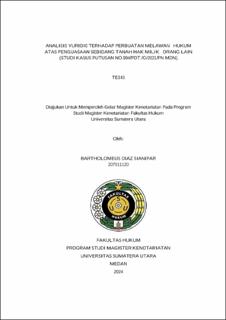| dc.description.abstract | Juridical control means that there is a right in that control which is regulated by law and there is authority for the right holder. Control in the juridical sense is control that has both civil and public aspects, and with control over land it is necessary to strengthen control over it, namely with Ownership Rights, Business Use Rights (HGU), Use Rights, or Building Use Rights (HGB) which will be the foundation for the person or institution that controls it. Unlawful acts are not only acts that directly violate the law, but also acts that directly violate other regulations. The general consequence of an unlawful act is problems within society, a disturbance in the balance of society, or in other words it is called an anomaly, because it involves various human interests, such as wealth, property, body, soul and human honor.
This research method uses a Normative Juridical research type which is descriptive analytical in nature. The data source uses secondary data sources using legal materials, namely primary legal materials, secondary legal materials and tertiary legal materials using library research data collection techniques (Library Research) and the data collection tool in this research is document study.
The research results show that a person can have rights to land for several reasons, namely: the occurrence of property rights according to customary law is regulated by Government Regulations. Government Determination, according to the methods and conditions stipulated by Government Regulations and statutory provisions. An unlawful act is an act that violates another person's rights or if a person acts contrary to his or her legal obligations which results in loss to another person, requiring another person to compensate for the loss. Decision No. 994/Pdt.G/2021/Pn.Mdn shows that the unlawful act submitted by the Plaintiffs against the Defendant is not proven and is not an unlawful act because the proof of the letter submitted by the Plaintiffs is not the basis for the Plaintiffs' ownership rights to the land and building which is above it. Moreover, regarding the Plaintiffs' argument which states that physical control of land plots for 20 (twenty) years or more in a row can be the basis for the Plaintiffs to own the land and buildings. However, the Panel of Judges is of the opinion that the provisions in question only apply to land that is not directly controlled by the State, whereas in the a quo case, the land and buildings that are the object of the case are land and buildings belonging to the State from the North Sumatra Province Food Crops and Horticulture Service. | en_US |


